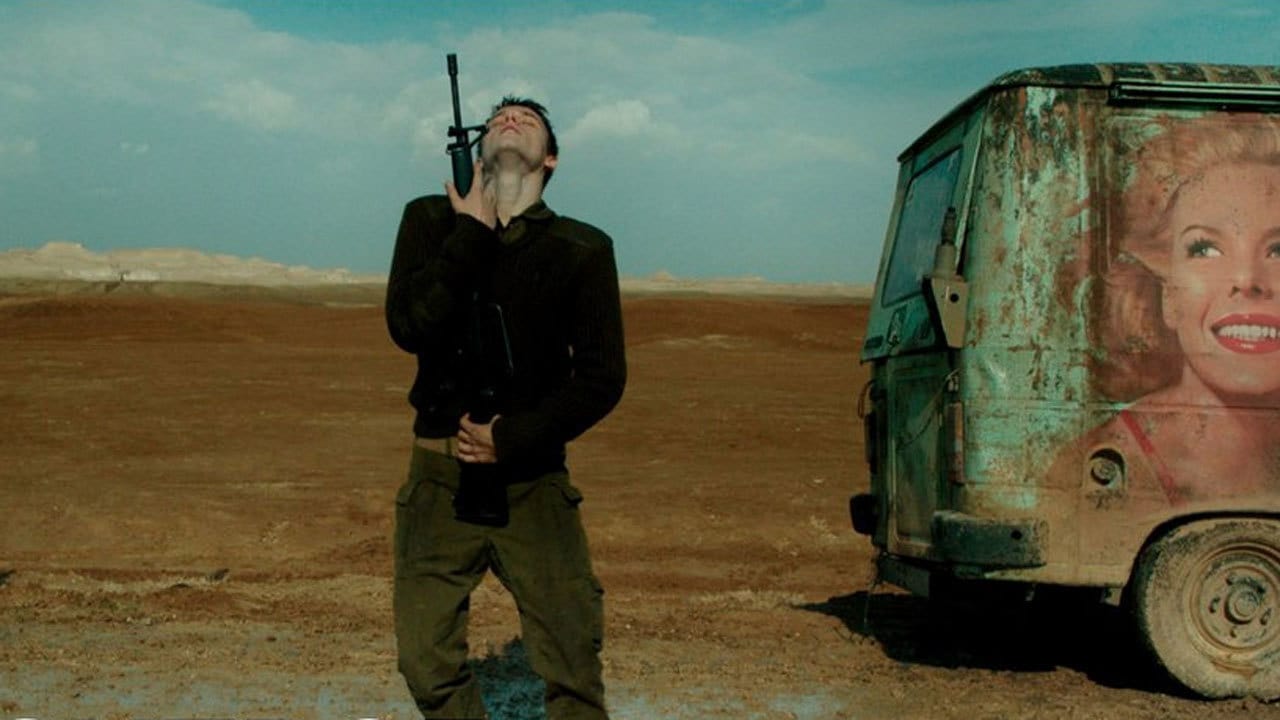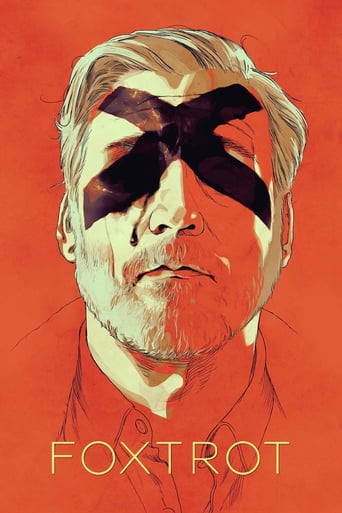e-70733
The film is unique in that it creates emotional stress by constructing a sense of space. The comical backtracking at the end is a genius. In contrast, some dialogues are somewhat lengthy.
The integration between the fatalistic theme and poetic photography failed to be tuned to the best. Therefore, when many of the seemingly idle (not actually) shots are already stunning enough, the film's over-construction in the play seems to be somewhat slightly redundant.
proud_luddite
Michael and Dafna Feldmann (Lior Ashkenazi and Sarah Adler) are a well-off Tel Aviv couple who have just received news that their young adult son was killed while on military duty.The narrative is told in three segments of equal length. The first exposes the family's reaction to the bad news; the second takes place in an isolated military checkpoint; the third returns to the Feldmann family home.Each segment has its own unique style. The first is much like the films of Ingmar Bergman with a lot of silent brooding, overhead shots, and many close-ups. It succeeds in exposing the physical toll of heartbreaking grief. There is also a fascinating scene involving a relative who has dementia. Its conclusion is, to say the least, shocking.The second segment seems dull in the beginning but this is likely deliberate as a way for the viewer to experience the lives of the four young soldiers at the checkpoint. They are living in terrible, secluded conditions with little happening in their daily routine. The dullness certainly ends in a couple of scenes near the end of this section - scenes which are a harsh critique of the Israeli military itself. The climactic conclusion of this segment is deliberately skipped and revealed only at the end via flashback.The final segment is the most fascinating. It leaves the viewer in the place of trying to understand what happened at the end of the second segment and the pieces gradually fit before the flashback scene in the epilogue. This segment also highlights the great acting talents of Ashkenazi and Adler whose ensemble is deeply touching especially during a moment of unexpected laughter.The talents of director/writer Samuel Maoz are on great display. In the most subtle of ways, he draws in the viewer to feel what the characters feel. And his screenplay is exemplary in its exposure of the wickedness of life and fate and for its very unique structure.OUTSTANDING ACHIEVEMENT: Screenplay by Samuel Maoz
Irena (irenaspa)
I've been expecting to see faster happenings in the movie, but no, I did not. As one drama, it is good in those segments where you can follow the main character's expressions, but on the other hand it is a bit boring because he is not the only character in it and almost all the rest are unconvincing actors. From time to time a director gives us pieces of black humor and that intention drives us not to be rigorous in giving comments. It is specifically in those scenes with four soldiers in shipping container, that is slowly sinking into the muck, and in which they are located to be while guarding the border. The best two things of the movie are those shots made from above and that little cartoon where we can see the story about what happened in the past and why. From my point of view, it is worth seeing, but it is not the perfect masterpiece as we wanted to see.
dromasca
Not only that there is no such thing as bad advertising, but bad advertising can help a lot. The success (public, critics, festivals) of Samuel Maoz's second film 'Foxtrot' may become at some point an example in the text books of cinema and public relations. The critics in Israel (including the Minister of Culture whose office actually supported financially the making of the film) who have trashed the film for its political attitude without seriously discussing it and (some of them, probably) without seeing it just succeeded to create a big fuzz around 'Foxtrot' which will make many Israeli film fans go and see it, and may also draw the attention and increase the international interest. Will the viewers be rewarded with an exceptional cinema experience? Not in my opinion. It's not a bad film, but it also has many disputable parts, and I am not referring only to the political approach. Will it win it an Academy Award? I very much doubt it will even make it through the selection, although, of course, I will be glad to be proved wrong.The film is built of three different parts, somehow like the three acts of a theater play. They may well be each of them a separate movies, as there are different leading themes in each of the acts, although they are interconnected. The first and the last part takes place in the house of the parents of a soldier, the middle one describes him and his comrades at the location where they are on duty, a a security checkpoint, someplace in an almost lunar landscape, that started to erode and decompose. A quote from Andrei Tarkovsky's Stalker comes to mind immediately, it's just that the natural disaster around symbolizes the more universal disaster that is ongoing. I liked especially the first part, which describes so well the nightmare that any Israeli parent who sent his kids to the army fears more than anything else in the world. At some point in time the story breaks and the worse news received by the parents turn to something different and behind their grieving are hidden more darker secrets. The second part includes the problematic scenes and the least that can be said is that the story of the soldiers just out of their childhood put into the impossible situation of policing the local population in the occupied areas is told from a very programmatic point of view. Can such incidents happen in reality? Hard to believe IMO, but they deserve a discussion, and the discussion should be about the events and not about the right to show them on screen. The last part takes us back to the parents home, and the critical approach now shifts against the mid-class Tel Aviv families busy with their neurotics and their own mean small personal traumas, unable to face reality and hiding themselves behind the smoke of grass.The three episodes have each their merits and their lose points, but they hardly come together, as each seems to carry its own message or more than one. Grief dominates the first, youth faced with war and politics dominate the second, escapism is the main theme of the third. It's a world that seems to have a hard time coming together, and so do the messages of this film that lack shared coherence. The film is full of symbols, too many, some quite good (the road leading to nowhere), some too obvious (the mud, the reclining cabin), some re-circulated from other movies trying to make the parts come together without really succeeding (the camel). When they try to be direct, the makers of the film failed, as in the schematic representation of the soldiers, the local population, and the relation between them. Lior Ashkenazi is fantastic in the first part, but his acting falls into mannerism and is less convincing later. Sarah Adler is a semi-miscast, too young for the role, spends much of the first part under sedation and never lets us understand her relationship with the father or the son. Overall my feeling was that this ambitious film failed in many respects because it tries to say too much and lacks one leading thread. As the dance in the title the story goes ahead, aside, and back, to return to the point where it started. It is still very much a film worth to see, even if some of the viewers will get to see it because of the wrong reasons, while some other will avoid it because of the same wrong reasons.

